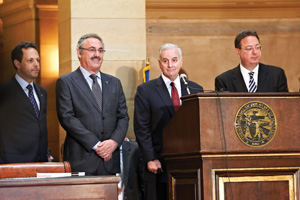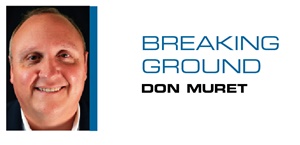Lester Bagley still runs into Vikings fans who thank him for the team’s flexibility in getting a new stadium deal done in Minnesota.
Bagley, the Vikings’ vice president of public affairs and stadium development, played a key role in getting legislation passed by the Minnesota Legislature to build a new $975 million facility in downtown Minneapolis.
In May, with two nights remaining in the 2012 legislative session to get a deal done, legislators told the Vikings that they would have to kick in an additional $50 million for the bill to be able to get to the floor for a vote. The Vikings agreed to the last-minute change in terms, increasing to $477 million the amount of private money to help pay for construction, about half the project cost. It drew a favorable response publicly compared with the state’s deal to build Target Field, in which the Twins contributed $130 million for a $530 million project.
 |
The media was just one of the constituencies Lester Bagley dealt with during the Vikings’ stadium campaign.
Photo by: STEVE SMITH
|
Vikings fans, living in a region that had grown weary of debates tied to public funding of stadiums, starting with the Twins and the University of Minnesota’s football stadium, recognized the team’s commitment to keeping the franchise in Minnesota, where it has played NFL games since 1961.
“The reaction since the bill passed has been incredible in the sense that when the Twins bill passed there was much grumbling about Twins ownership,” Bagley said. “The Vikings are putting in more than three times the money the Twins put in their deal, 49 percent of capital costs.
“My point here is the Wilfs stepped up. It was an interesting end to a long saga.”
For Bagley, those pats on the back are especially gratifying. Over the past 13 years, Bagley worked tirelessly to get a stadium deal done, starting in 1999 as a consultant under former team owner Red McCombs, and for the last seven years as a Vikings vice president.
In that time, Bagley has outlasted two Minnesota governors, Jesse Ventura and Tim Pawlenty, both of whom had no interest in building a new stadium for the Vikings, and several other politicians tied to a state Legislature with 201 members, one of the largest in the nation.
“Many of the players have changed except for Lester,” said Tina Smith, chief of staff for Minnesota Gov. Mark Dayton. The governor, unlike his two predecessors, stood in the Vikings’ corner as a stadium proponent. “He was able to grit it out. Lester never threw in the towel.”
 |
Bagley (right) with (from left) the Vikings’ Mark and Zygi Wilf and Minnesota Gov. Mark Dayton at the Capitol in St. Paul.
Photo by: STEVE SMITH
|
In that respect, Bagley reminds former boss
Duane Benson of the stray cats he encountered growing up in rural Iowa.
“We lived on a farm and my mom would tell us … to take them out to a field and dump them,” said Benson, who worked with Bagley at the Minnesota Business Partnership and is now a member of the authority overseeing stadium development. “No sooner would we do that than they would beat us home. It’s the same thing with Lester, that willingness to beat you home. You can’t sidetrack him. He’s a cat you can’t dump.”
Bagley, similar to Benson, grew up in a small farm town of Barron, Wis. His father ran a few businesses, including a successful farm implement dealership. His mother had a long career working for the Farmers Home Administration, which was part of the federal government.
Their work ethic rubbed off on Bagley. He got his start in public affairs as a student at UCLA working on the unsuccessful 1982 Senate campaign of U.S. Rep. Barry Goldwater Jr. Through that campaign, he met some staff members in the Reagan White House. After serving as an intern for White House press secretary Larry Speakes, Bagley decided to pursue a full-time career in government relations. After working for legislators in Oregon and Wisconsin, Bagley landed a job with the Minnesota Business Partnership, a group of CEOs representing the state’s 100 largest companies.
It was working as the group’s associate director from 1993 to 1999 that got Bagley’s feet wet in public policy at the state level, representing the business interests of Fortune 500 companies such as 3M, Best Buy, General Mills, Target and US Bank.
David Olson, president of the Minnesota Chamber of Commerce, has known Bagley for 15 years, dating to when both were involved with the partnership. Their paths crossed again on the Vikings stadium issue, with Olson teaming with the speaker of the House to develop a proposal all legislators could support.
The Bagley File
Notes on Lester Bagley, Minnesota Vikings vice president of public affairs and stadium development:
■ Bagley grew up in Wisconsin in an era “when you learned first about the Packers and then about the presidents and U.S. history. Other than my mother and brother, who are Vikings fans, my entire family are Packers fans, which makes family gatherings interesting. Like many NFL execs, when I began to work for a team and spend time with staff, coaches and players, my allegiance to the Vikings lined up quickly.”
■ Bagley attended the University of Minnesota for two years before transferring to UCLA, where he graduated with a degree in political science. He studied abroad at Oxford one summer, taking courses covering British government and the works of William Shakespeare.
■ The Vikings built a database of thousands of Vikings fans and stadium supporters, organized by legislative districts, and encouraged those fans to show their support by contacting state legislators. “By paying attention to and cultivating this grassroots support over time, we were able to turn Vikings fans loose at the Capitol, a rally at the Mall of America and at City Hall,” Bagley said. “It paid off during the home stretch of the legislative session.”
■ Public affairs is a field “where you have to be able to do a lot of different things well — sometimes at the same time — from message development and delivery, to media relations, advertising, grassroots organizing, lobbying, coalition building and campaign management,” Bagley said. “Bottom line, it’s a people-driven business. You have to be able to work well with a wide array of people, backgrounds and political affiliations.”
— Don Muret
“The key thing is there was a pecking order on these stadiums and the Vikings followed the rules,” Olson said. “There were a lot of expectations Lester navigated through. I’m sure the Wilfs ran out of patience a long time ago.” Bagley displayed the “patience of Job,” he said.
There are few states where the process could have been more complicated than in Minnesota, a populist state where the debate for publicly funding a third stadium in 10 years played out under the bright lights of the local media.
“The thing about Minnesota is it’s a very open form of government,” Bagley said. “Not to point at other states where deals are done in the back room, but in Minnesota, everything is done excruciatingly in front of the public.”
The previous two years, Vikings stadium bills had died in session, and it looked like a third bill was headed down the same path this year before NFL Commissioner Roger Goodell flew to Minnesota in April and asked everyone to put partisan politics aside and reach a solution.
The league’s involvement was critical, Bagley said. Goodell asked legislators to “help us get the bill to the floor,” he said. “For many years, we were never able to do that. We felt if we could get the bill to the floor, we would have a decent chance of passing it.”
Every political system has its own quirks, said Mark Wilf, Vikings co-owner and president, and through the strong relationships Bagley has developed over the years with legislators, he kept a finger on the pulse of the ups and downs inside the House and the Senate, as well as the governor’s office.
“He knew when to bring things up and when not to, where to meet and with who, and what points we needed to press on,” Wilf said. “Lester was very helpful in advising us on the issues.”
Educating the Wilfs, the New Jersey developers who bought the Vikings in 2005 and were looked upon as outsiders on the issue, to the nuances of Minnesota politics was an important part of Bagley’s task, said Sen. Julie Rosen, the author of the stadium bill.
There were times, though, when Rosen told Bagley he had to stay positive.
“My colleagues grew tired of hearing about how the Vikings had waited years and years for their project,” Rosen said. “I gave Lester some constructive criticism — keep his eye on the ball moving forward.”
This fall, as the Vikings move ahead with stadium development and hire an architect and a builder, Bagley is taking a step back from his advocacy role. As vice president of public affairs, Bagley still oversees the team’s public relations and community relations departments, and he hopes to be part of the city’s effort to help Minneapolis secure the 2018 Super Bowl. The stadium is set to open in 2016 on the site of the Metrodome, and the Vikings have already applied to the league to play host to the game.
Bagley has thought about working for other teams facing similar challenges to get new facilities built in their markets. For now, those considerations are on the back burner, he said.
“I have two young boys and a wife who grew up in Minneapolis, so we are fairly well rooted in the Twin Cities,” Bagley said. “Right now, I am trying to catch my breath from the long, winding road.”
Don Muret can be reached at dmuret@sportsbusinessjournal.com. Follow him on Twitter @breakground.






